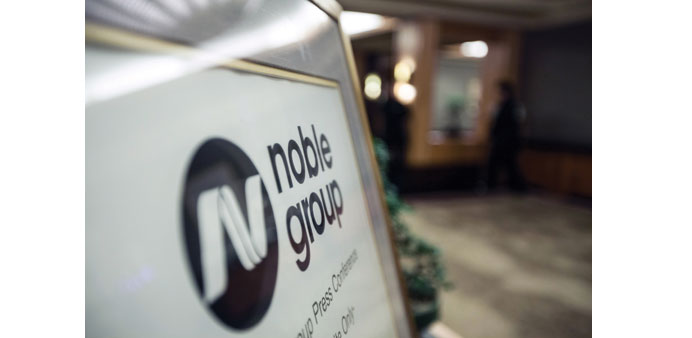Noble Group signage is displayed outside during an investor day in Singapore. Amid the carnage in commodity markets, Noble says it has been on a roll in oil markets.
Reuters
New York
For Noble Group, a decades-old commodities firm whose founder started out in scrap metal yards, 2015 has been an unusually scrappy year. The Hong Kong-based group, Asia’s largest merchant trader of raw goods, has seen its earnings and stock price hurt by plunging metals values and a report that questioned its bookkeeping.
Amid the carnage in commodity markets, Noble says it has been on a roll in oil markets. Its traders, who focus on arbitrage in physical fuel and crude markets, have persevered as oil prices fell to six-year lows and some counterparties imposed more burdensome credit requirements on Noble.
“It has been a very good year, particularly in the Americas,” Jeff Frase, co-head of global energy, told Reuters in an interview. He detailed the company’s growing focus on oil trading, which until recent years was a relatively small portion of its sprawling business across metals, agricultural products, and broad energy markets.
Trading in oil liquids was key to Noble generating positive cash-flow for the first time this year during the third quarter, in spite of a 90% drop in the profitability of its metals business during the first three quarters. Over those nine months, its oil supply chain saw operating income rise 92% versus year-ago levels and traded 30% more physical volume, he said.
The success in oil markets came even though Frase acknowledged Noble was feeling the effects of tighter credit conditions across the industry. Some trading counterparties have moved from relatively loose payment terms on trades with Noble to requiring letters of credit, or bank guarantees ensuring payment.
That has not impacted Noble’s ability to do business, Frase said. The more cautious terms are a “natural progression,” and have been occurring between many players amid a market slump, though Frase said that the credit trend “probably hit Noble earlier than others this year.”
The firm’s bookkeeping methods were questioned by little known research group Iceberg Research earlier this year, spooking some investors. The company named PwC to conduct an independent analysis of its accounting practices, which determined that they met international standards.
Overall, Noble reported an 84% drop in third-quarter profit, and CEO Yusuf Alireza said it would work to raise $500mn from investors or through asset sales.
Frase said discussions on potential asset sales have taken place, though he declined to offer any details. Several of Noble’s competitors, including Glencore, Gunvor and BTG Pactual, have also been considering asset sales.
Ratings agency Standard and Poor’s also warned last month that it may cut Noble’s credit rating into junk territory, underscoring bond market concerns about Noble’s cash flow. Noble’s Singapore-listed shares are down more than 60% this year.
Noble’s chairman Richard Elman began trading at age 15 in British scrap metal yards before moving to Asia and founding Noble in 1986.
Noble has benefited from its access to massive oil tanks. Traders able to stockpile supplies can turn a quick profit due to a prevailing oil market condition known as contango, when oil for delivery in the future is priced higher than spot barrels.
Noble leases or owns 13mn barrels of tank capacity in the Americas region, Frase said. It has additional space in Asia and Europe.
A major global refined fuel marketer, Noble has become one of the top US Gulf Coast gasoline blenders, Frase said. From the premiere US refining region, it moves fuels along pipelines including Colonial - which runs from Texas to New Jersey – to distributors along the Eastern Seaboard, where gasoline commands higher prices.
It has also shipped growing volumes of fuel into Latin American markets, where Frase says Noble has been gaining market share. Some of the region’s largest crude exporters – Venezuela, Ecuador and Mexico among them – have grown increasingly reliant on refined fuel imports to meet local demand.
The scenario can be a cash cow for merchant traders. Last year, Noble struck a billion dollar loan deal with PetroEcuador and said it would supply as much as 50% of Ecuador’s gasoline and diesel imports for five years. Volumes grew as Ecuador’s largest refinery Esmeraldas underwent a major revamp.
Noble also sells fuel to Venezuela’s cash-strapped state oil company PDVSA, whose refineries have been in decline.

